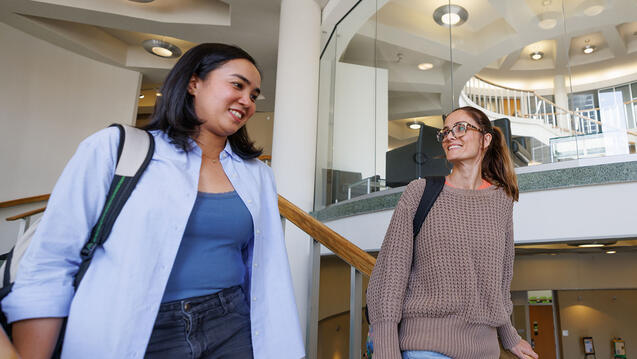The University of San Francisco School of Law Embeds GenAI Into Core Curriculum
SAN FRANCISCO (April 16, 2025) – The first of its kind in legal education, the University of San Francisco School of Law (USF Law) has integrated generative AI (GenAI) into its first-year curriculum as a core part of how students learn to think, write, and advocate as legal professionals.
During the 2024-2025 academic year, USF Law’s Legal Research, Writing, and Analysis (LRWA) program began embedding GenAI across foundational learning outcomes. The goal is to prepare students from day one to work with emerging technologies in ways that reflect real-world legal practice and do so professionally, with ethical, sound judgment. The LRWA program is required for all first-year J.D. candidates.
“We’re not teaching AI as an add-on. Instead, we’re integrating it throughout our Legal Research, Writing, and Analysis program because AI isn’t a separate skill or tool, but rather an integral part of how lawyers work today,” said Professors Megan Hutchinson and Nicole Phillips, incoming co-directors of LRWA and affiliated faculty with the USF Center for Law, Tech, and Social Good. “We want students to treat GenAI as a tool that demands legal judgment, clear communication, and ethical awareness.”
In addition to AI instruction as an elective course and an upper-division seminar, USF Law has woven it into the fabric of its curriculum, mirroring how lawyers encounter and use technology in practice.
Students learn to:
- Use AI in legal analysis and evaluate AI-generated legal content, focusing on efficiency while critically evaluating its output for errors in reasoning, accuracy, clarity, and structure.
- Use iterative prompting to revise and improve AI outputs, building stronger arguments and more effective legal writing.
- Accelerate legal research by augmenting traditional methods using a variety of legal AI platforms.
- Confront ethical issues, including confidentiality, bias, and the responsible use of emerging tech tools.
First-year law student Ruth Alcantara adds, “In class, we’ve explored how we can use AI to support our research process, to make our legal writing more effective, to develop the judgment to know when and how to use it ethically, and as a resource to practice our oral argument skills. I now feel prepared to go into my summer job knowing how to work with these constantly changing tools.”
This integrated instruction reflects the broader mission of the Center for Law, Tech, and Social Good and supports USF Law’s commitment to preparing students for the legal challenges of a tech-driven world. By embedding GenAI into legal education early, USF Law is helping students build the skills—and judgment—they’ll need to lead in a profession that’s rapidly evolving.
“Technology is reshaping legal work. We’re making sure our students are ready not just to keep up, but to shape the future of the field,” said Hutchinson and Phillips.
About the USF Center for Law, Tech, and Social Good
USF’s Center for Law, Tech, and Social Good is an academic center and training ground for lawyers, lawmakers, policy-enforcers and aspiring lawyers to examine the social impacts of emerging technologies and their regulation using an ethical framework. The Center’s mission is to pioneer the integration of legal education with emerging technologies to advance the social good. Through innovative education, rigorous research, and collaborative projects, the Center aims to tackle the foremost legal challenges presented by the digital era. For more information, visit the Center for Law, Tech, and Social Good website.
About the University of San Francisco School of Law
Founded in 1912, the University of San Francisco School of Law educates skilled lawyers who graduate with the professional knowledge and theoretical foundation necessary to succeed in the legal profession. The USF School of Law offers a rigorous education with a global perspective in a diverse, supportive community. USF Law offers full- and part-time Juris Doctor programs that empower students to develop their analytical abilities, master legal writing and research skills, acquire a firm foundation of the law, explore an array of specialties, and refine their professional legal skills in practical settings. The law school also offers Master of Laws (LLM) programs in Taxation, Intellectual Property and Technology Law, and a general, customizable LLM (for foreign lawyers), and a Master of Legal Studies in Taxation (MLST) for non-lawyers. The USF School of Law is fully accredited by the American Bar Association and is a member of the Association of American Law Schools. For more information, visit the School of Law website.


